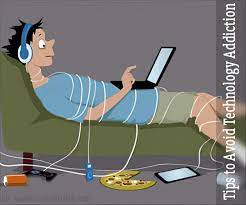Addiction to digital media, or excessive screen time, is a growing problem, especially among young people. A person’s psychological, physiological, and interpersonal health can all suffer as a result. It is your responsibility as a parent to encourage your children to adopt healthy lifestyles and strike a healthy balance with technology.
There are a variety of approaches that parents can take to help their kids overcome digital addiction and develop positive relationships with technology. Parents can help their children find a healthy balance with screen time and avoid the negative consequences of excessive screen time by keeping a few things in mind.
Certain disturbing tendencies are appearing, but the discussion of this topic benefits from a healthy dose of humour and perspective. According to a study conducted in 2013, the typical American adolescent between the ages of 13 and 24 now spends 16.7 hours per week engaging in non-email Internet activity and 13.6 hours per week engaging in television viewing. While this is not necessarily harmful, it does represent a change from the leisure activities of previous generations.
However, in people who are genetically predisposed to addictive behaviour, these behaviours can progress to harmful ones in the same way that drugs, alcohol, and other compulsive behaviours can.
Your child may not have an addiction to video games, but I think you could make the case that too much time spent on digital entertainment at the expense of face-to-face interaction has negative effects on social skills, problem solving, physical fitness, and even more localised issues like headaches and carpal tunnel syndrome. Let’s look at some ways you can help your kids overcome their reliance on technology and enjoy life to the fullest.
Also Read: Innovative Apple Lisa Is Now “open Source” as A Result of Computer History Museum.
Define Screen Time Limits

Limiting children’s screen time is one of the most effective ways to help them reduce their tech use. Instead of approaching this from an authoritarian stance, you should consult with the child to determine what is considered reasonable use. It’s important to offer some options so that kids don’t feel like they’re missing out when they have to put down their devices. For example, you could create a cosy nook in their bedroom where they can curl up with a book or invest in a space where they can paint or play games outside, depending on their ages and interests.
Is there a way to stop kids from becoming addicted to their devices?

- It takes courage for parents and carers to set firm limits for their children. The following are examples of possible countermeasures:
- No more than 30 minutes should be spent at a time in front of the TV, computer, or mobile device. In general, kids shouldn’t be exposed to more screen time than is recommended for their age group.
- Set aside screen time at a specific time each day, and encourage your child to participate in enjoyable physical activities on the other days.
- Keep the TV and other electronics out of your kid’s bedroom and make sure they are put away when not in use.
- Maintain tech-free zones, including at the dinner table, while doing homework, and before bed. Moreover, you can set up ‘tech-free’ zones in the home, including the bedroom, the dining room, and the car.
- Instill in your kid an appreciation for moderation from an early age. Encourage your child when he or she uses technology responsibly and abides by your rules.
- Use the gadget with your child to keep tabs on how much time they spend on it. Make use of this time to talk to your loved ones and discuss what’s important to you as a family.
Because of the busy schedules that most of us keep, it’s not uncommon for parents to turn to electronic devices to occupy their children. Parents and other caretakers should still make time to interact with their children in the midst of their regular routines and activities by listening to them, playing with them, taking them out, and talking to them.
Also Read: How to Fix iPhone Stuck in Headphone Mode?
Show yourself to be a worthy example:

When it comes to raising children, they watch what you do more closely than they listen to what you say. They learn quickly by watching and imitating their parents’ actions. Establishing firm guidelines to follow is crucial. If you limit the amount of time you spend on your phone, you’ll have more energy and patience to devote to your kid. The importance of these moments spent together with your child cannot be overstated in terms of building a solid parent-child bond.
Contrary to what they tell their children, many parents spend most of their time on their smartphones. In such families, offspring are destined to repeat their parents’ habits. Do as you would have others do. Be a responsible parent and set a good example by limiting your own smartphone use. Spend more time talking, hugging, and playing with your kids instead of staring at a screen.
Also Read: How to Fix Black Screen with Cursor in Windows 10?










